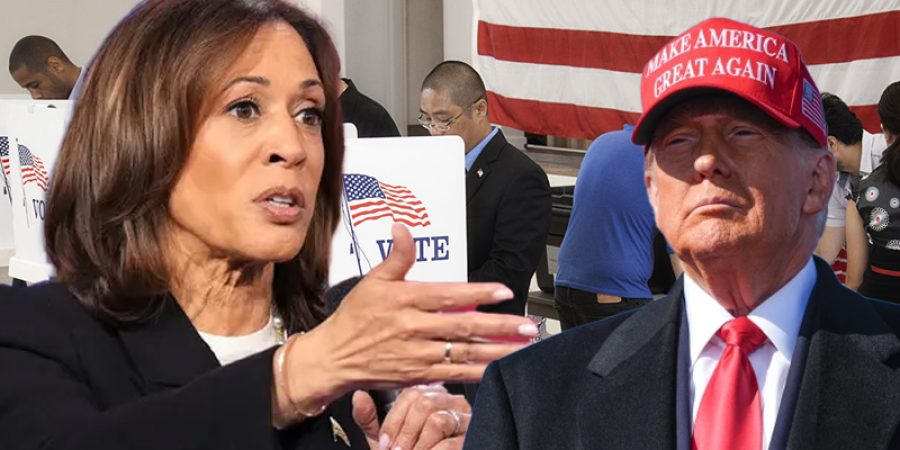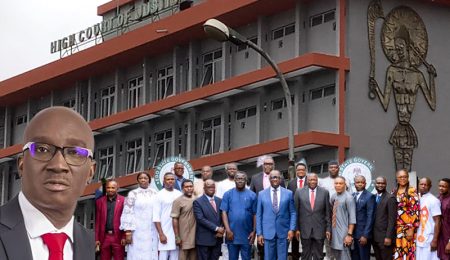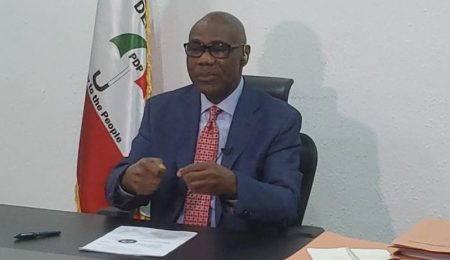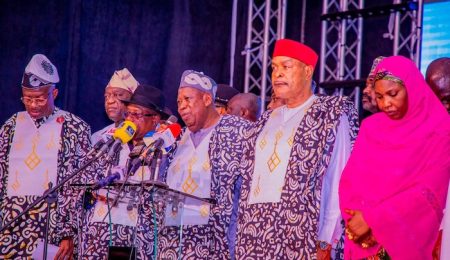Tens of millions of US citizens will be going to the polls on Tuesday for the country’s tightly contested presidential election, a two-horse race between Vice President Kamala Harris and ex-President Donald Trump.
Over 70 million Americans have already cast their votes, in what would be one of the most consequential elections in recent US history.
The policies and programmes of the candidates couldn’t be more starkly different. For the first time in many election circles, women’s reproductive health, especially their right to abortion, is playing a crucial role in the election.
In effect, that could mean that women might well come out en masse and be the ultimate deciders of the all-important exercise.
But even more historic is that for the first time in America, there is a real chance of the country electing its first female president, more so, a mixed race woman. Will America dare to elect its first female president? We know the answer is just hours or days away.
On the other hand, Trump, the candidate of the Republican Party, will also be breaking some records if he makes a comeback. Having survived two assassination attempts, convicted of 34 felony charges, found liable by a New York Court of sharp business practices, and fined nearly $500 million, and having been impeached twice, accused of being a racist, fascist and so on, will Americans hand him the keys to the White House for another term?
Seen by a section of American voters as an extraordinary candidate, never seen in the history of America, Trump appears to have surmounted every negativity, whether those thrown at him by his political detractors or in many cases, the ones that are self-induced.
Besides, poll after poll have shown that other key concerns to Americans include immigration and the economy, two main issues that are expected to significantly swing the votes.
In all, the election will see the end of almost two years of non-stop exhausting political campaigns, including a last-minute switch of the Democrats’ erstwhile candidate, President Joe Biden, who was replaced by his vice, Harris, in July.
The nail-biting election, which has left many voters on edge, is also expected to significantly alter the dynamics of major crisis points around the world, including the conflict between Russia and Ukraine; the war between Israel and Hamas, and, by extension, Iran and others. The outcome of the polls may also affect the confrontations in Yemen, Sudan, Myanmar, among others, depending on who eventually emerges victorious.
Several polls have come out with mixed results and largely predicted a very tight race between the two major contenders, with the election just a day away.
An exclusive USA TODAY/Suffolk poll at the weekend showed Harris and Trump tied in Pennsylvania, the swing state with the most electoral votes, while a The Washington Post poll of likely voters and registered voters saw Harris leading Trump by one percentage point.
Harris, 60, was at 48 per cent among both likely and registered voters, while Trump,78 was at 47 per cent.
But Harris’ lead in the battleground states has slimmed from a Harris/Forbes poll released a week earlier; at that point Harris had a 50 per cent-to-46 per cent advantage. Some voters remain undecided, the latest poll found, with 10 per cent of likely voters and 16 per cent of all registered voters still weighing their choices.
Harris was also leading Trump in Michigan in a new Detroit Free Press poll released this weekend, showing the vice president leading 48 per cent to 45 per cent, with a margin of error of ± 4 points.
But Trump is leading Harris in Florida in a new Stetson University Centre for Public Opinion Research poll, with 53 per cent to 46 per cent for Harris.
In the blue state of Massachusetts, Harris appears to be getting the same support President Joe Biden and candidate Hillary Clinton received from voters in the 2020 and 2016 elections, suggested the MassINC Polling Group’s final poll of Massachusetts voters.
Harris leads Trump 61 per cent to 31 per cent in the poll. But a Reuters report found Harris’ lead over Donald Trump dwindled in the final stretch of the US presidential contest, with the Democrat ahead by a single percentage point over the Republican, 44 per cent to 43 per cent, according to the Reuters/Ipsos poll.
Where Harris, Trump Stand on Key Policies
Both Harris and Trump have widely differing positions on many policy issues, ranging from education and taxes to social security and Medicare. As they compete for the White House, both candidates have laid out their plans in speeches, campaign ads and media interviews.
Most of it amounts to a wish list, sketched out in broad strokes and lacking concrete details about how they would be implemented or paid for. A number of Trump’s proposals raise legal questions, while some of Harris’s would probably require Democratic control of Congress.
On reproductive rights, after the conservative-dominated US Supreme Court in 2022 struck down the constitutional right to abortion, Democrats made restoring access to reproductive care a core campaign issue.
Harris was a vocal proponent of reproductive rights before she became the nominee, assailing Trump and Republicans for creating a “healthcare crisis” that has led to the preventable deaths of women seeking abortion care.
As a candidate, she has called on Congress to pass legislation to restore the protections of Roe v Wade, which the Supreme Court overturned in 2022 and which, in effect, blocked states from banning abortion before foetal viability, or about 24 weeks of pregnancy. As president, Harris has vowed she would veto any nationwide abortion ban.
Harris pledged to protect access to contraception and other fertility treatments, such as in vitro fertilisation (IVF). She has also touted efforts by the Biden-Harris administration to safeguard access to medical abortion and protect women who cross state lines to access the procedure.
Trump has, alternately, bragged about his role appointing three Supreme Court justices whose votes were decisive in overturning Roe, and complained that bans on abortion in Republican-controlled states may hurt him electorally.
Trump said abortion access should be left to the states, and vowed that as president he would not sign a national abortion ban.
He has also said that if he wins he would make IVF free for women, though he has provided few specifics and Republicans in Congress have repeatedly blocked legislation that would protect the treatment.
As for immigration, Trump has made it central to his campaign, promising mass deportations of millions of immigrants living in the country without authorisation. In a second term, he has vowed to go much further than he did four years ago.
He has promised to carry out the largest domestic deportation operation in US history. He has said he would reinstate several controversial policies from his first term, including the Remain in Mexico programme, and a travel ban targeting several Muslim-majority nations. He has vowed to rescind programmes that shield undocumented people from deportation, including children.
But Harris has mainly stated that she would revive a bipartisan congressional agreement when it comes to addressing US immigration policy. She has sought to flip the script on immigration, one of her biggest political vulnerabilities.
While housing is typically handled at the local level, both presidential candidates want to tackle the housing crisis at the federal level, according to States Newsroom, the nation’s largest state-focused non-profit news organisation
On taxation, the tax law crafted under the Trump administration in 2017 is set to expire next year, meaning whichever candidate wins the White House will either overhaul the previous law or extend it
Regardless of who wins the White House, the next president will have several international crises to address. They include the Israel-Hamas war in the Middle East, Russia-Ukraine conflict, and US-China trade relations.
On the issue of inflation, while the overall economic picture has brightened in recent months, Harris has said she agrees with Americans that prices are “still too high” after several years of significant inflation.
She wants to build up the “opportunity economy,” focused on the middle class, with plans to combat price gouging, boost housing development, aid first-time homebuyers, and expand tax credits for parents.
She has pledged to cut taxes for tens of millions of middle- and low-income families, while saying she supports tax breaks for entrepreneurs and small business owners. She also backs a proposal championed by Trump to eliminate taxes on tips.
On trade, Harris is expected to maintain the Biden administration’s approach, relying on tariffs and export controls to boost domestic competitiveness with China. On the campaign trail, she has also touted the Biden administration’s ambitious investments in infrastructure and renewable energy.
But much of Trump’s inflation-reduction plan hinges on his vow to slash energy costs by expanding oil and gas drilling and deregulation, though economists say his plans for sweeping tariffs and mass deportations could actually raise costs.
He has also been highly critical of high interest rates, the Federal Reserve’s main inflation-fighting tool.
Trump said recently that he thought the president should have a say in decisions made by the Fed, which traditionally operated independently from politics.
In a second term, he has vowed to extend and expand a suite of tax cuts he signed into law in 2017, while pledging to cut the corporate tax rate to 15 per cent, from 21 per cent for companies that make their products in the US. He has also said he would exempt social security benefits, in addition to tips, from income taxes.
Harris, like Biden, views Trump as a direct threat to democracy. She has highlighted her role as a prosecutor to draw a contrast with Trump, who was found guilty of 34 felony counts in a New York hush-money case over his attempt to influence the outcome of the 2016 campaign.
He also faces several other cases related to his efforts to overturn his 2020 defeat and his handling of classified documents. Harris has relied on anti-Trump Republicans to help remind Americans of Trump’s role inciting the deadly attack on Congress of January 6, 2021.
But Trump has never stopped fully repeating that his 2020 presidential election loss to Joe Biden was marred by fraud. He has refused to say whether he would accept the results of the 2024 election, suggesting that the only way his opponent could win is if she cheated, The Guardian reported.
He has also said he would pardon defendants convicted for their roles in the January 6 attack on the US Capitol.
Besides, Harris’s approach to foreign policy has hewed closely to the president’s, with an emphasis on maintaining the US’s global alliances. She has fully aligned herself with the Biden administration’s response to Russia’s invasion of Ukraine nearly three years ago, pledging unyielding support for the nation.
Harris has repeatedly attacked Putin’s “brutality” and warned that Trump would force Ukraine to “surrender” to Russia.
In the Middle East, Harris, again, has been broadly supportive of the administration’s approach to Israel’s widening war, which began in Gaza and now includes Lebanon, Yemen and Iran. Like Biden, Harris has called for a ceasefire in Gaza in exchange for the release of hostages taken by Hamas on October 7, 2023.
She has signalled a continuation of Biden’s tough-on-China approach and has said she would honour the US’s commitments to Taiwan.
But Trump, who shares isolationist impulses, has repeatedly said that the world was a more peaceful place when he was in power.
He has long been a sceptic of global alliances. With many of his supporters opposed to continuing the flow of US aid to Ukraine, Trump has vowed to “fundamentally re-evaluate” the country’s approach.
He has claimed that he will end the nearly three-year war on his first day in office, but offered no details on how he might accomplish this.
Trump has long cast himself as a champion of Israel, despite a long history of anti-Semitic remarks. Though he says he supports Israel’s mission, he has been critical of its tactics and has tangled with its leader, the right-wing prime minister, Benjamin Netanyahu.
Harris has said unequivocally that the climate crisis is caused by human activity and represents an existential threat to the nation and the planet. She is a proponent of electric vehicles – though does not support a mandate – and backs clean-energy tax credits.
In contrast, Trump has questioned established climate science, previously dismissing the climate crisis as “mythical” and an “expensive hoax”. He has also said that the warming climate is not necessarily responsible for making extreme weather events worse. On the campaign trail, he has summed up his position with the declaration: “Drill, baby, drill,” said a The Guardian report.
What the Election Means for Africa
BMI, a Fitch Solutions Company, in its latest report, stated that the election will have limited impact on Nigeria and Sub-Saharan Africa (SSA) because they remain low in Washington’s policy agenda.
But it argued, “Under a Harris presidency, we would see continued support for the US’s key allies in SSA, such as Nigeria and Kenya. Harris is likely to adopt a softer tone towards countries with good relations with China and Russia, supporting US-South Africa ties
“US dollar would likely strengthen under Trump, leading to weaker SSA currencies and increased inflationary risks. Potential tariffs on China imposed by Trump could slow Chinese growth, negatively impacting SSA exports.”Director-General, Nigerian Institute of International Affairs (NIIA), Eghosa Osaghae, writing for the Council of Councils, an international initiative to connect leading foreign policy institutes, said the US presidential elections had always been of interest to Africa because of the crucial role the country played in the stability and development of the continent.
Osaghae stated, “Thus, the hope in Africa is that the U.S. presidential election can provide the opportunity for a positive reengagement with the continent’s flashpoints of decay and instability.
“Part of that hope is that the United States will support the reform and strengthening of the UN and other multilateral bodies to make them more inclusive and equitable agents of global governance.
“Developments in Sudan, Congo, and the countries of the Sahel-all of which have seen geopolitical realignment toward China and Russia-have already signalled growing discontent and impatience with the West as Africa struggles to surmount its existential challenges.”
He argued that the realignment of the US-Africa relations will require a tempering of the US-centric rhetoric that had driven conversations on immigration, trade, aid, and multilateralism.
Senior Fellow for Africa Policy Studies, Council on Foreign Relations (US), Ralph Bunche, argued that although as was typical in the US election cycles, US- Africa policy did not figure prominently—or at all—Africa was changing rapidly, with old relationships and regimes under new stress.
Bunche stressed, “Afropessimism is lazy and reductive, as some changes do bring new opportunities to unleash the continent’s potential, but there is no escaping the reality that the region confronts massive challenges.
“… In a continent that has seen a rash of military takeovers and where polls show popular dismay with how democracy is working, struggles in the United States only exacerbate existing doubts.
“As for the electoral outcome, another Donald Trump administration would presumably operate much like its first iteration, meaning that Africa policy will be largely an afterthought and the climate-related issues so important to the continent will be ignored by the United States.”
Former Nigerian foreign affairs minister, Professor Bolaji Akinyemi, argued on Arise Television that Harris will be a strong opponent for Trump in the election, highlighting that she will be difficult for Trump to defeat.
Akinyemi said, “President Biden’s choice of Kamala Harris as the presidential candidate of the Democratic Party is a good choice, not necessarily because of her own character but because she is the vice president.
“Kamala Harris is going to be a hard nut for Trump to crack. Be careful of lawyers, especially someone who has been an attorney general and prosecutor.
“She will take you to pieces with the way she will put her own questions and the way she will use you to wipe the floor. She won the Senate seat by 60 per cent from California when she ran, so you see that she is not an easy nut to crack.”
Emmanuel Addeh
Follow us on:



